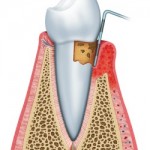 Early-stage gum disease, known as gingivitis, may be treated with a routine dental cleaning, but in susceptible individuals the condition requires more specialized treatment as it advances to periodontitis and beyond.
Early-stage gum disease, known as gingivitis, may be treated with a routine dental cleaning, but in susceptible individuals the condition requires more specialized treatment as it advances to periodontitis and beyond.
Gum disease occurs when the bacteria found in plaque and tartar begins to attack the soft tissues of the mouth. The body’s immune system is then triggered and mounts a defense against these bacteria. The resulting inflammation causes the gums to become severely swollen, and pockets may develop between the gums and the teeth, providing another spot where oral bacteria may gather.
A periodontist can perform scaling and root planing to remove that plaque and tartar from the area between the gums and the teeth’s roots.
Gum disease occurs when the bacteria found in plaque and tartar begins to attack the soft tissues of the mouth.
In a scaling and root planing, which is performed using a local anesthetic, the area under the gums is thoroughly cleaned to remove plaque and tartar. Ultrasonic instruments can be used in this process to improve patient comfort.
If there are rough spots on the roots, where bacteria can collect, the periodontist will also smooth the root surfaces as needed.
When successful, scaling and root planing will eliminate inflammation and reduce the size of pockets in the gums. Scaling and root planing is the least invasive periodontal disease treatment option available. If the patient’s condition doesn’t respond to this intervention, the periodontist may need to look at surgical alternatives.
After patients undergo scaling and root planing, they must take steps on their own to prevent a gum disease recurrence that would necessitate another round of treatment. Twice-daily brushing and daily flossing is a must, and a mouthwash may also be recommended for patients who have undergone scaling and root planing.
When left untreated, early gum disease (gingivitis) may continue to progress to periodontal disease, leading to potentially devastating consequences like bone loss and even tooth loss. The inflammation associated with periodontal disease may also spread elsewhere in the body.
It’s essential to address gum disease in a timely fashion, so if you’ve been diagnosed with the condition, contact the Manhattan office of Drs. Susan Karabin and Edward Gottesman at 212-756-8890 to learn more about treatment options like scaling and root planing.


